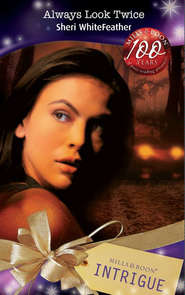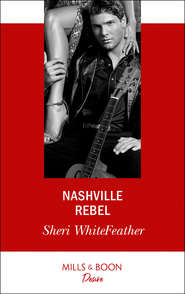По всем вопросам обращайтесь на: info@litportal.ru
(©) 2003-2024.
✖
The Heart of a Stranger
Автор
Год написания книги
2018
Настройки чтения
Размер шрифта
Высота строк
Поля
Cáco washed her hands and dried them on a paper towel. Her bun had come loose, and now her bound hair dangled softly on the back of her head. Silver discs danced in her ears, spinning two carefully engraved bear paws.
“We don’t know what happened to him,” she finally said.
Lourdes turned to stir the macaroni and cheese. “He was beaten.”
“Yes, he was.” The old woman began mixing a ranch dressing for the salad. “But he was meant to come here. To find you. To return the necklace.” She lifted her head, her dark eyes glittering. “And we’re meant to help him. To be here when he needs us.”
Lourdes wanted to argue, but she couldn’t. Cáco often knew things, sensed things that left other people with goose bumps. Of course that didn’t make her an all-wise, all-knowing Indian. Sometimes she twisted logic and made life seem more supernatural than it was.
Cáco’s superstitions ran deep. She refused to gaze in a mirror when the sky thundered, fearful lightning would look in and strike her. She’d tied crow feathers to the twins’ cribs when they were babies to protect them from evil influences. Cáco had insisted on either that or a taxidermy-stuffed bat to watch over the girls.
Lourdes had agreed to the feathers.
She looked up to find Cáco staring at her.
Okay. Fine. A stranger had appeared out of the blue, wearing a piece of Lourdes’s heart.
“I won’t call the sheriff,” she found herself saying. She wouldn’t let the authorities intervene. Not yet. Not while the man was still under Cáco’s care.
“Good.” The stubborn old woman’s lips twitched into a triumphant smile. She liked getting her way.
Lourdes added a little water to the pork chops, making them sizzle. Her skin had sizzled, too. Heated from his touch. “He’ll probably want to contact the police on his own.”
“Maybe.” Cáco blended the salad dressing with a whisk. “And maybe not. We shouldn’t push him. He needs to rest.”
Already the old woman had become possessive of the injured stranger, protecting him as if he were one of her own. But Lourdes had expected as much.
“Mama?” a small voice said.
Lourdes turned to see her daughters standing in the doorway. Her beautiful girls, with their long, tawny hair and root beer-brown eyes. They held hands, as they often did, clutching each other the way they must have done in the womb.
Nina, the chatterbox, and Paige, the observer. Sometimes they conversed in an odd guttural language, words only the two of them understood.
They probably wouldn’t have minded being watched over by a stuffed bat.
“Can we see the sick man?” Nina asked.
Lourdes wanted to gather her inquisitive little chicks and hug them close, shield them from what had been done to the stranger, but keeping them away from him would only make them more curious.
She glanced at Cáco for approval and received a silent nod in response. Then a word of caution.
“Try not to wake him.”
Nina’s eyes grew big and innocent. “We’ll be quiet.” She turned to her sister. “Won’t we?”
Paige bobbed her head, and as Lourdes led them to the guest room, both girls walked with an exaggerated tiptoe, proving how quiet they could be.
Their silence didn’t last.
They gasped when they saw him, sleeping amid his bruises.
“He has lots of ow-ees,” Nina said.
“Yes, he does.” Lourdes gazed at Cáco’s patient. He lay on his side, one long leg exposed, the other tangled within the sheet. He held a pillow next to his body, the way a man might hold a woman he intended to keep.
Gently, possessively.
Suddenly her skin grew warm, and she longed to touch him, to feel the impression the silver cross made against his chest.
What impression?
The necklace wasn’t a brand. And for now, it was hidden, trapped against the pillow in his arms.
“Did somebody hurt him, Mama?” Paige, the observer, asked.
“Yes.”
“Who?”
“I don’t know.”
Paige and Nina moved forward. Lourdes tried to stop them, but the children slipped past.
The four-year-olds stood for a moment, just staring at the stranger, then they reached out and patted his hair, giving him the kind of comfort they liked to receive.
Lourdes’s eyes went misty. Her girls had never known a father. There were no important men in their lives, no one to offer masculine guidance.
Of course the louse who’d sired them wouldn’t have fit the bill. Gunther Jones had been a criminal and a convict, a drug addict and a thief.
And what kind of man are you? she wanted to ask the sleeping stranger.
Maybe he was married. Maybe he had a wife and children, a family who loved him, who wondered and worried why he hadn’t come home.
She glanced at his left hand, at the absence of a ring. Then again, maybe he was single. Or divorced. Or—
What? A criminal? A thief?
I should call the sheriff, she thought.
But she’d promised Cáco that she wouldn’t.
“Come on,” she said to the twins, drawing them away from the bed. “It’s time to eat.”
She prodded her daughters out the door, then stopped to look back at the man.
The handsome intruder was already weaving his way into her life.
Two











